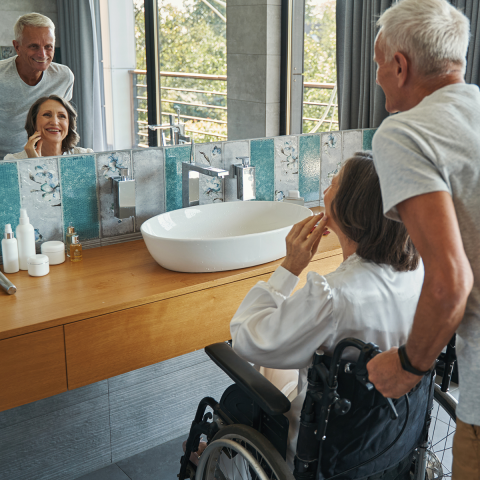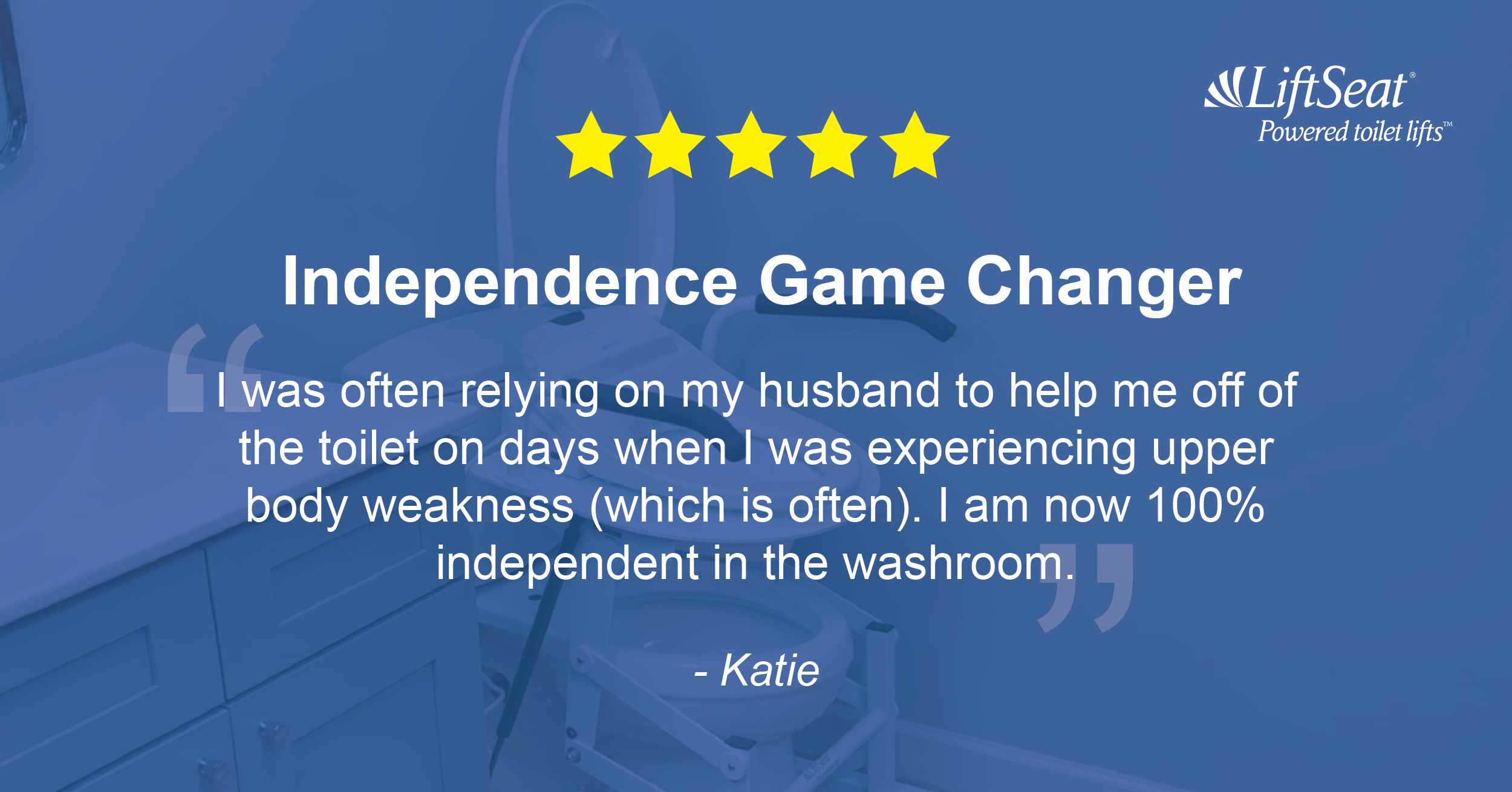Restoring Dignity: The Mental Health Benefits of Bathroom Independence
06/09/2025
An individual’s level of functional independence plays a critical role in their mental health and overall happiness.1 From early life through adulthood, the ability to perform daily tasks without assistance is closely tied to overall quality of life. When that independence is lost—due to illness, injury, or aging—it can lead to a range of difficult emotions, including frustration, shame, and loss of dignity.
Bathroom tasks present a unique challenge, as most tasks performed here are inherently private. Introducing assistive technology can provide psychological benefits, for both the care provider and the recipient, by supporting greater bathroom independence and reducing reliance on caregiver support.
The Impact of Independence on Mental Health
People vary in how strongly they value independence - a quality known as “independence centrality.” For those who value independence deeply, losing the ability to care for themselves can significantly impact mental health.2
One study that examined the relationship between independence centrality and depression in individuals with spinal cord injury (SCI) found that “SCI survivors with high independence centrality experienced more depressive symptoms when disability increased, but less depressive symptoms when disability decreased.” Conversely, the study also found that “SCI survivors low in independence centrality were less affected by changing levels of disability.”2
Another study looking at the emotional impact of needing spousal support on individuals with osteoarthritis of the knee/hip also found an association between higher independence centrality and signs of depression. The study reported that “spousal support was associated with greater depressive symptoms and slower walk time in patients with high independence centrality, but there were no effects of spouse support on these outcomes for patients with low independence centrality.”3
The Importance of Supporting Activities of Daily Living (ADLs)
Maintaining independence related to activities of daily living, which are defined as “routine tasks that most healthy individuals can perform without assistance”4 is of particular importance. The ability to perform these essential tasks, which include eating, getting dressed, bathing, using the toilet (and more), is closely linked with overall well-being.
In a survey of over 100,000 individuals receiving Medicare-based care, a strong correlation was identified between the ability to perform ADLs and mental health. Survey respondents who reported loss of ADL independence, particularly those related to personal care, were also more likely to experience large declines in mental health.5
The Unique Role of Toileting
Toileting is a frequently performed ADL, with the average person needing to use the bathroom multiple times per day (and often overnight). The layout of the average bathroom can make it challenging for individuals with mobility restrictions, increasing the need for assistance when using the toilet.
As toileting is generally a private task, the reliance on a caregiver for assistance can cause emotional distress. When asked about toileting, a group of surveyed stroke survivors and the occupational therapists they were working with, revealed that “independence in toileting was important in avoiding the need for assistance and in avoiding feelings of decreased self-esteem.”6
Impact of Toileting Assistance on Caregivers
Assistance with toileting can take a toll on caregivers as well. Performing toilet transfers (helping some on and off the toilet) is very physically demanding, especially for non-professional caregivers. Even professional caregivers, who have training in safe lifting techniques, can sustain injuries during transfers.
Beyond the physical strain, the need to provide toileting assistance can have negative psychological effects on caregivers, including greater perceived burden and lower quality of life.7
Empowering Bathroom Independence with a Power Toilet Lift
To increase independence in the bathroom while decreasing caregiver strain, assistive devices should be considered. For toileting, there are several available options, ranging from simple raised toilet seats to mechanical lifts. Careful consideration should be given when choosing a toileting aid to maximize safety and comfort – especially for individuals with moderate-to-severe mobility restrictions and lower limb weakness.
Power toilet lifts, like the LiftSeat Independence series, are an excellent option for supporting bathroom independence because they offer maximum support and cleaning assistance. LiftSeat power toilet lifts gently raise and lower users on and off the toilet at an optimal angle and speed, minimizing the need for caregiver lifting. They also offer a bidet option for hands-free cleaning, allowing many individuals to use the bathroom completely independently.

Given the emotional and physical toll of toileting assistance, for both caregivers and recipients, a power toilet lift is a tool worth considering for anyone who needs ongoing assistance using the bathroom. To learn more about LiftSeat, and what sets them apart from other toileting solutions, click here: https://www.liftseat.com/
References:
- Lee, Sophia & Anderson, Michael. (2025). How Perceived Independence Affects Life Satisfaction Through Motivation in Individuals with Acquired Disabilities. KMAN Counseling and Psychology Nexus. 3, 1-10. https://doi.org/10.61838/kman.rc.psynexus.3.6
- Monin, J. K., Schulz, R., Martire, L. M., Connelly, D., & Czaja, S. J. (2014). The personal importance of being independent: associations with changes in disability and depressive symptoms. Rehabilitation psychology, 59(1), 35–41. https://doi.org/10.1037/a0034438
- Martire, L. M., Stephens, M. A., & Schulz, R. (2011). Independence centrality as a moderator of the effects of spousal support on patient well-being and physical functioning. Health psychology : official journal of the Division of Health Psychology, American Psychological Association, 30(5), 651–655. https://doi.org/10.1037/a0023006
- Edemekong, P. F., Bomgaars, D. L., Sukumaran, S., & Schoo, C. (2025). Activities of Daily Living. In StatPearls. StatPearls Publishing.
- Albanese, A. M., Bartz-Overman, C., Parikh Md, T., & Thielke, S. M. (2020). Associations Between Activities of Daily Living Independence and Mental Health Status Among Medicare Managed Care Patients. Journal of the American Geriatrics Society, 68(6), 1301–1306. https://doi.org/10.1111/jgs.16423
- Clark J, Rugg S. (2005) The Importance of Independence in Toileting: the Views of Stroke Survivors and their Occupational Therapists. British Journal of Occupational Therapy, 68(4):165-171. doi:10.1177/030802260506800404
- Shogenji M, Yoshida M, Kakuchi T, Hirako K (2024) Factors associated with caregiver burden of toileting assistance at home versus in a nursing home: A cross-sectional study. PLOS ONE, 19(3): e0299721. https://doi.org/10.1371/journal.pone.0299721
This content is not intended to be a substitute for professional medical advice, diagnosis, or treatment. Always seek the advice of your physician or other qualified health provider with any questions you may have regarding a medical condition.